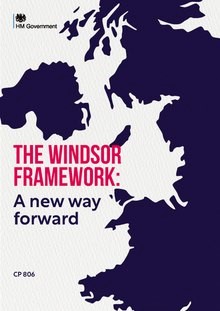
The long awaited Windsor Agreement was announced at the end of February. Essentially, this agreement is a “Northern Ireland Protocol 2.0” with simplifications and easements to lessen the burden of traders in NI and to appease those in the Unionist community of NI.
The announcement has largely been met with positivity from businesses East/West and North/South. The certainty provided by this agreement will allow investment and infrastructure decisions to flow and have the potential to make Northern Ireland the Singapore of Europe. As the Prime Minister Rishi Sunak commented, Northern Ireland could become the “World’s most exciting economic zone”.
So, what is in the deal?
- Ultimately, significant easements on goods movements have been made for NI consumers. This has been achieved by the imposition of green lanes for traders selling within NI. Those in Green lanes will not have to provide commodity codes for each movement, nor will they have to submit supplementary declarations.
- Those who register for Trusted trader schemes will be able to use “green” lanes with unprecedented reductions in paperwork. Members of the current “UK Trader Scheme” will be automatically enrolled into the new Trusted Trader Scheme. Those in this scheme will not be required to
- EU law will still apply to NI. however an “emergency brake” to NI legislative changes can be pulled by the NI assembly in “exceptional circumstances” if 30 of the 90 members from at least two parties vote to block the adoption of EU single market rules. However, this brake will not be applied unilaterally until it has been discussed by the EU and UK sides first. Should the UK decide to unilaterally make changes then the EU could take targeted “remedial measures”.
- Agri Foods – must be labelled “not for EU”. However, the EU will allow UK public health standards – a significant easement on the original protocol.
- Real time data sharing of GB/NI movements will be provided by the UK to the EU in order to help identify fraud or noncompliance to protect the single market.
- Parcels moving GB to NI will not have any customs checks. The original agreement required full customs checks on each parcel. This is a significant benefit for NI consumers.
- Red Lane goods will go through full customs checks. Goods travelling onto the ROI market or for suppliers not part of the Trusted trader schemes will require full customs processes.
- State Aid – Under the original agreement the UK felt that EU rules were cast too wide. The changes in the framework mean that up 98% of existing NI subsidies would not need EU approval. However, the rules still apply in that UK state aid to NI cannot have a “material effect on trade between NI and the EU”.
- Steel imports – Certain types of British steel when brought into NI from GB had to pay tariffs last year due to EU quota rules. This has now been removed.
- Medicines – The original protocol would have caused too much disruption to the supply of medicines for NI. Medicines can now be labelled for UK and be sold to NI freely.
When will these changes come into place?
Not yet, is the answer to this. Both sides must legislate for the agreement.
On the EU side an indicative timetable, the changes to the protocol could be endorsed by April 17th. The UK have not yet announced a timetable for the implementation. However the NI secretary did say that it is likely that a vote by MPs would take place by the end of March. There is likely to be a soft touch approach in the UK in order to help those against the original NI protocol to sell the deal to their respective political bases.
What should I do now?
If you are a NI trader and selling goods exclusively in NI you should apply to the UK Trader scheme now so that you can be co-opted into the new Trusted Trader Scheme.
If in doubt speak to your trusted customs advisors Easy Customs.
